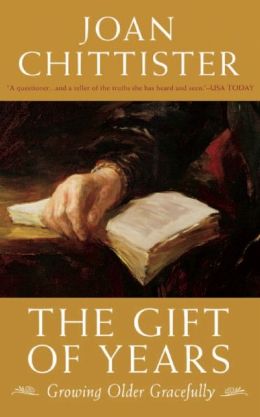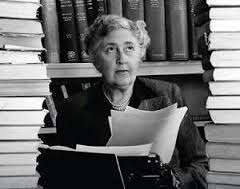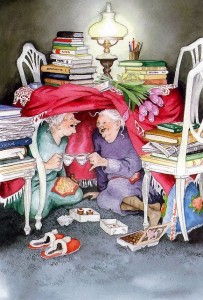 I’m continuing to reflect on Joan Chittister’s book, The Gift of Years: Growing Older Gracefully. You can catch up on my previous posts from her writing here:
I’m continuing to reflect on Joan Chittister’s book, The Gift of Years: Growing Older Gracefully. You can catch up on my previous posts from her writing here:
“Spring Forward” (on Time) from March 9
“Joy… Bring It!” from February 23
“The Twinges of Regret” from February 16

Today’s topic is “Learning.” Chittister opens the chapter with this wonderful quote from Agatha Christie:
I have enjoyed greatly the second blooming that comes when you finish the life of the emotions and of personal relations and suddenly find—at the age of fifty, say—that a whole new life has opened before you, filled with things you can think about, study or read about…. It is as if a fresh sap of ideas and thoughts was rising in you.
 The second blooming. I love that phrase! And even before reading this chapter, I knew I would be saying “yes!” and “amen!” over and over with each sentence. And I did. Because, as Christie said, at the age of fifty (when I began seriously writing and painting) I felt everything she mentions—the fresh sap of ideas and thoughts, the desire to learn and do new things. The only thing different about my experience than what Christie says is that I am definitely not finished with “the life of the emotions and of personal relations.” I guess I’m bringing that unfinished part of the early and middle stages of my life into this later stage with me. So I’m kind of a hybrid elder-in-process.
The second blooming. I love that phrase! And even before reading this chapter, I knew I would be saying “yes!” and “amen!” over and over with each sentence. And I did. Because, as Christie said, at the age of fifty (when I began seriously writing and painting) I felt everything she mentions—the fresh sap of ideas and thoughts, the desire to learn and do new things. The only thing different about my experience than what Christie says is that I am definitely not finished with “the life of the emotions and of personal relations.” I guess I’m bringing that unfinished part of the early and middle stages of my life into this later stage with me. So I’m kind of a hybrid elder-in-process.
For those who believe that aging minds aren’t capable of such blooming, Chittister says:
Other mental abilities begin to sharpen as well. We become more reflective, more analytical. We become more able to assimilate and assess data. We begin to notice other dimensions of the world, of people, of events, of ideas beyond data, and to absorb them into our answers. We bring experience to knowledge and then add wisdom to our results.
And what if we don’t feed this growth, these new blooms? We are in danger of becoming depressed if we let our minds be idle and surrender to the temptation to think of ourselves as diminished. This is part of what Chittister calls “passive aging.” She encourages us to embrace “active aging” instead—to compensate for some of the physical effects of age by finding ways to work around them. And the key, she says, is lifetime learning:
One of the clearest signs of healthy aging drawn from the Harvard University longitudinal Study of Adult Development becomes more important as life spans increase. Lifelong learning, the study says, makes the difference between healthy and unhealthy aging. It determines the degree to which life will be satisfying to us, as well as the degree to which we will be interesting, valuable, life-giving to others.
Interesting. Valuable. Life-giving to others. I want to be all of those things. I hope that I have given something alive to the students in my iconography workshops and to the industrious folks attending writing workshops and conferences I have helped organize. I hope that the salons—some literary, others on women’s issues—I host in our home are interesting and valuable to my guests. I hope that the essays I have published and the novel I’m working to finish will offer something—inspiration or at least entertainment—to my readers. Chittister says that folks my age have something to offer and I’m trying to rise to her challenge:
Why wouldn’t this capacity for learning be exactly what is needed in a generation whose responsibility is to bring the wisdom of the years to the questions of the times?… A blessing of these years is that we find ourselves at a time of life when we can finally concentrate on all the tings we have ever wanted to learn and know and, as a result, become an even more important, more focused, more spiritual person than we have ever really been before.
Here’s to lifetime learning and second blooming.
We know we are supposed to think positively about aging, but when the arthritic trigger finger is locked into painful place or we can’t remember our own social security number for a moment, it’s hard to stay optimistic. This is a great little jolt to remind us that old age is what we make of it and to revel in the wisdom that comes with it.
Thanks for this post! It reminded me of this article in the NY Times about people embarking on new endeavors in their later years. http://www.nytimes.com/2015/03/21/your-money/finding-success-well-past-the-age-of-wunderkind.html?smid=fb-share&_r=0
again, love Joan and you! Yes, I’ve heard over and over from several of my elderly (more elder that moi) friends to never stop learning, and: “You don’t learn something new and end up somewhere old.”